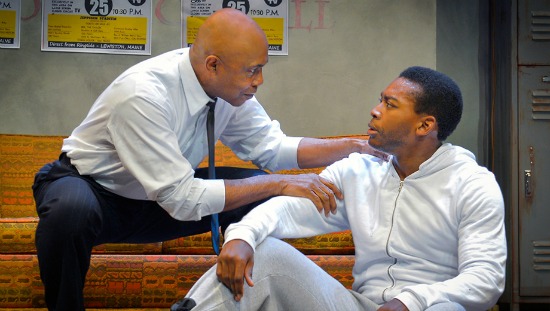 The unusual alliance, in 1965, of boxer Muhammad Ali with Stepin Fetchit, the Depression-era comedian and stereotype, seemed so odd that it certainly deserves an imagined play chronicling their interaction.
The unusual alliance, in 1965, of boxer Muhammad Ali with Stepin Fetchit, the Depression-era comedian and stereotype, seemed so odd that it certainly deserves an imagined play chronicling their interaction.
Will Powers’ “Fetch Clay, Make Man” does just that, and in a dynamite production at Bethesda’s Round House Theatre direct from California, packs in all manner of pertinent race issues of the Civil Rights era as well.
Almost wholly imported from the Marin Theatre Company of San Francisco, where Round House producing artistic director Ryan Rilette had that same job five years before coming to the D.C. area, it brings in a number of talented actors.
None are more perfect than Eddie Ray Jackson as Ali, bringing a rare athleticism and boxer’s build to a role that doesn’t attempt impersonation of the rhyming champion as much as it does the embodying of his spirit.
Jackson brings the brash confidence of the good-looking boxer who had changed his name from Cassius Clay after embracing the Nation of Islam, but also a vulnerability in how much is riding on his shoulders and whether he can actually beat Sonny Liston again in the looming rematch.
Roscoe Orman is perfect as Fetchit, a character almost lost to history, who was in fact the first black actor with a screen credit and Hollywood’s first black millionaire — all from a laconic character he created so well, people thought it was his actual personality. It was such an effective characterization that Fetchit, whose real name was Lincoln Perry, was blamed for promulgating the widespread stereotype, effectively putting an end to his career especially as the civil rights movement was building.
He would claim he was misunderstood and actually broke ground in film (for refusing to do the white man’s jobs), but nobody even bothered to ask. Fetchit was adrift and largely washed up when Ali called him to visit his training camp in Lewiston, Maine, to learn what the old actor knew about the secret punches of the champ of his era, Jack Johnson.
In Derrick Sanders’ effective staging, Orman does his one screen-style imitation of the star as the play begins, seemingly stepping out of the black and white projections to do his bit of funny business.
But for the rest of the production he’s the older, wiser Fetchit, happy to be plucked out of obscurity by the most famous fighter of the land, but also struggling to extend it into some kind of opportunity.
Physically, Orman is a dead ringer for the older Fetchit, and is a good fit with the younger Jackson to portray this unexpected team. But when you learn that Orman is an accomplished actor who originated Gabriel in the original Broadway production of “Fences” who himself is known to a couple of generations of as Gordon of Sesame Street, the mind really starts to boggle. As Gordon, he was in his time as effective a pop culture integrationist as Fetchit was in his. But until someone writes a play about him, his glorious portrayal of the old film star will do just fine.
Two more highlights in the cast are from D.C. theater circles, led by the show stopping Katherine Renee Turner as Ali’s strong-willed wife Sonji, a vibrant woman still adjusting to her Muslim attire.
Jefferson A. Russell’s role might be thought a throwaway — a tough bow-tied Muslim enforcer. But he shows some range and complexity in the role as well.
Even Robert Sicular’s smaller role as a studio boss is well handled as well in a couple of flashback scenes reflecting Fetchit’s time in Hollywood.
The playwright Power has a lot to pack into the play, including who was to blame for Malcom X’s murder a few months earlier, the status of the black power movement, and women’s role in it. Maybe he tries to put in too much.
The immediate dramatic tension is the impending prize fight, and whether Fetchit will be able to remember enough of Johnson’s technique to make a difference. When the drama stacks up the issues in act two, a viewer can only feel nervous for the champ: Get these people out of the dressing room and let him prepare.
For all the action that occurs there, Courtney O’Neill’s set is authentic and serviceable; its side stages covered in hanging ribbons that serve to offset the action behind them or reflect Caite Hevner Kemp’s strong black and white projections onto them.
Sanders’ direction keeps the action moving along with the ideas; not a problem when the leading actor is dancing and jabbing half the time.
There aren’t many shows around that address so many still timely issues of race and role models, featuring casts this tight. The result is an exhilarating night at the theater, and, dare I say, a knockout. [Here’s a thing I wrote for the Post about Stepin Fetchit]
-0-
 A nearly 100-year old play by Luigi Pirandello would seem to be a dusty old thing to attempt to stage.
A nearly 100-year old play by Luigi Pirandello would seem to be a dusty old thing to attempt to stage.
But dress it up in kicky 60s clothes on a nifty modernist set with vintage Italian pop songs playing at any chance that comes and it becomes some pretty fine entertainment.
That the 2003 adaptation by Martin Sherman, best known for “Bent,” changed the title from the original “Right You Are, If You Think So” to the more splashy “ABSOLUTELY! {perhaps]” gives you an idea of how much he punched it up.
In fact, the most old fashioned thing about the play, currently getting a zingy revival by the Constellation Theatre Company at Source, is that townspeople would be concerned that a man who invited his mother in law to live there would install her at an apartment on the other side of town rather than home with his wife and her daughter.
It may be hard to get worked up over that arrangement, but the locals here, perhaps because they have nothing else to do, are absolutely in a lather about it, whipping up all kinds of rumors and speculation as they descend into a level of gossip that is too juicy to ignore.
Amid it all is one droll skeptic, Lamberto Laudisi, played with some measure of glee by Ashley Ivey. He presides over a phalanx of upset gossips that include his sister (Sarah Pretz), brother in-law (Toby Mulford) and niece (Julia Klavans) and their excitable friends (Catherine Deadman and Matt Dewberry). All are quite good, though another daft friend (Teresa Spencer) is slightly less convincing, as sometimes happens when someone too young is cast to play a middle aged lady.
Michael Glenn is quite melodramatic as the man they are all gossiping about. But that may be part of his intent: He’s overacting to convince the others. A big standout is Kimberly Schraf as the mother in law, who creates a character of mystery and intrigue.
(That isn’t even all of the cast: Tyler Herman, Julie Garner, Connor J. Hogan and Lizzi Albert round out the troupe).
Yet “ABSOLUTELY {perhaps]” isn’t just about finding out the truth of the situation (though it is none of their business), it’s about playing with the notion of truth itself.
For this, there’s nobody better than the chuckling, martini-sipping Lamberto, putting on ear splitting dance records on the hi-fi in between the others’ squabbling.
And it’s all played out on a set that fits right in with the most fashionable furniture boutiques on 14th Street, one you’ll want to disassemble and move to your own house. Reuniting the team that created Constellation’s “36 Views” a year ago, A.J. Guban turns out a dazzling mid-60s modernist set, with perfect little accents, including one whole wall of a metal cubist design and a ceiling that is big, circular and mirrored. With the seats set close in, it’s like we are guests of this glorious apartment (indeed some of its seats are right next to those in the front rows).
Just as eye-catching are the candy colored period costumes by Kendra Rai, whose uses of oranges, yellows, turquoises and pine greens in each of the outfits provide a continuity among even the most oddball character as the tasty and catchy songs chosen by sound designer Palmer Hefferan makes you wish there was a soundtrack album to pick up.
That they move and swirl and plop on the couch as one are thanks to Allison Arkell Stockman’s exacting direction, adding extra business to seemingly every scene, enhancing Pirandello’s already clever text with clever physical touches, such as the play’s memorable closing flourish.
On living up to Constellation’s stated goal of “visual spectacle, music and movement unit(ing) with an exuberant acting ensemble to create an exhilarating entertainment experience,” this fun and fast-moving kaleidoscope of color and cunning fills the bill absolutely (and not just perhaps).
“Fetch Clay, Make Man” runs through Nov. 2 at the Round House Theatre, Bethesda, MD.
“ABSOLUTELY! {perhaps}” by the Constellation Theatre Company runs through Nov. 9 at Source, 1835 14th St. NW, Washington, D.C.